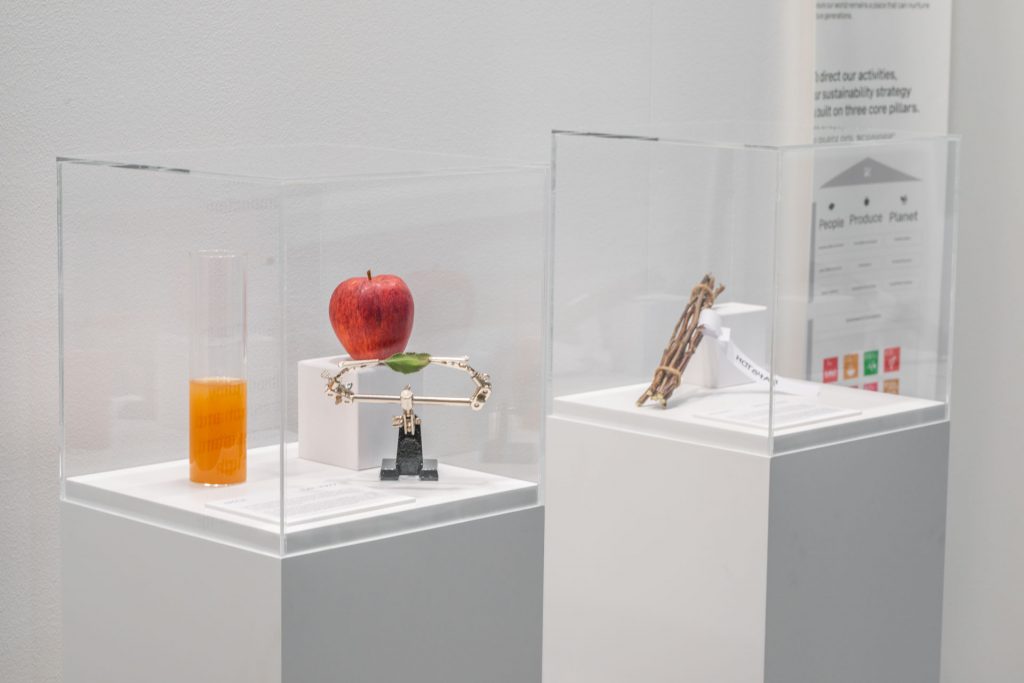The museum of endangered foods

The Museum of Endangered Foods is a traveling exhibition by design
studio Sharp & Sour to react on one of the most underestimated conse-
quences of climate crisis: the extinction of foods. The causes are many-
fold: from excruciating, rising temperatures to fresh-water scarcity, extre-
me and irregular weather patterns, habitat loss and deforestation, pollu-
tion and heightened vulnerability to plagues, predators and disease.
Some of the most endangered food species in the world right now are
avocados, cacao and wine. But also, some of the most basic ingredients
in the kitchens all over the world, such as potatoes, chickpeas, fish, ba-
nanas or coffee. This exhibition aims to put the focus on the ecological
vulnerabilities threatening each of these foods in the hope that food will
be a more palpable and approachable take on climate crisis.
BayWa Global Produce is aware of the explosive nature of the issue and
tackles the problems associated with climate change in a variety of
ways. As a partner of the Museum of Endangered Foods, BayWa Global
Produce shares industry knowledge with the creative collective of Sharp
& Sour and the public audience and would like to raise awareness about
the climate crisis.
The extinction of apples?
Apples are at their best as a temperate climate fruit crop. As the climate
changes, we’re seeing rising temperatures and more extreme weather
events. This puts apples in danger. Some more temperate regions that
currently lend themselves as ideal growing areas may face heat waves
and droughts, making the land a hard place to grow traditional apple va-
rieties such as Fuji, Elstar, Gala and Jonagold.
Acknowledging this, the BayWa Global Produce family is focused on the
long-term sustainability of apple production and developing innovative
and more sustainable growing practices, including new plant genetics.
New plant varieties are critical so growers can produce climate change
resistant apples and consumers can continue to enjoy great tasting,
crisp apples. To lay the foundation for this, BayWa Global Produce’s sub-
sidiary T&G Global has established VentureFruit™, which works closely
with breeders, research partners, growers, and sales and marketing
partners to develop and commercialise varieties of outstanding quality.
This ensures BayWa Global Produce is a strong partner for the develop-
ment of an attractive future-oriented product portfolio from breeding right
through to sales – for stable supply chains and long-term success.
Consumers will continue to demand tasty, healthy and safe food from sustainable production
Benedikt Mangold CEO BayWa Global Produce
Creating sustainable varieties for a warming world
The Hot Climate Programme is a global industry leading breeding pro-
gramme established in 2002, in which The New Zealand Institute for Plant
and Food Research, the Institute of Agrifood Research and Technology,
Fruit Futur and VentureFruit™ have joined forces to develop and com-
mercialise new apple and pear varieties which have been specifically
bred for high temperature growing areas. This is just one example of the
joint approach towards a better, more resilient world of fresh produce.
The first variety to be commercialised by VentureFruit™ is ‘HOT84A1’,
which was successfully trialled in Spain where temperatures reach more
than 40ºC. In addition to ‘HOT84A1’, the Hot Climate Programme has a
strong pipeline of new apple and pear varieties which are being evalua-
ted for taste, flavour, texture and appearance, and which will be commer-
cialised in the future.
HOT84A1 is a red-skinned, juicy, sweet apple, with great crunch and it’s proven to be sunburn resistant, which is what’s needed for high temperature growing areas and for regions previously not suitable for growing apples.
Peter Landon-Lane, Managing Director, VentureFruit™
HOT84A1
DISCOV. 2016
The apple ‘HOT84A1’ is the first variety to be commercialised from the
global pan-industry Hot Climate Programme. Initiated in 2002, the program-
me brings together The New Zealand Institute for Plant and Food Research,
the Institute of Agrifood Research and Technology in Spain, Fruit Futur, an
association of fruit producers in Catalonia, and T&G Global’s VentureFruit™
business.
Created through natural breeding, ‘HOT84A1’ has been developed specifi-
cally to be grown in areas experiencing high temperatures as a result of a
changing climate. It has been successfully trialled in Spain, with Venture-
Fruit™ now commercialising the variety globally, with licensed commercial
plantings already underway in Spain and test plantings underway in New
Zealand, Australia, Europe, the UK, South Africa and China. In 2022-23, test
plantings will extend into the Americas.
APPLE
EXP. 2050*
Apples (Malus Domestica) do not originate in Europe, as one might think,
but in the Tienshan Mountains of Kazakhstan where they were probably
already cultivated 10.000 years before Christ. In antiquity, apples found their
way to Europe via the so called “Silk Road”. First to Greece, then on to Rome
and from there to all of Europe.
Today, various growing regions are facing challenges due to climate
change. Impacts on apple crops caused by extreme weather events, late
frosts or intense sunlight and heat can lead to considerable damage, quality
losses or even crop failures. Looking ahead it can be assumed that relevant
parts of the traditional growing regions might no longer be suitable for the
cultivation of classic apple varieties in the long term.
*Sample date for current growing regions particularly affected by climate change.